Members could employ the same mechanism used in 1974 to freeze apartheid South Africa out of the General Assembly, Anton Ferreira reports.
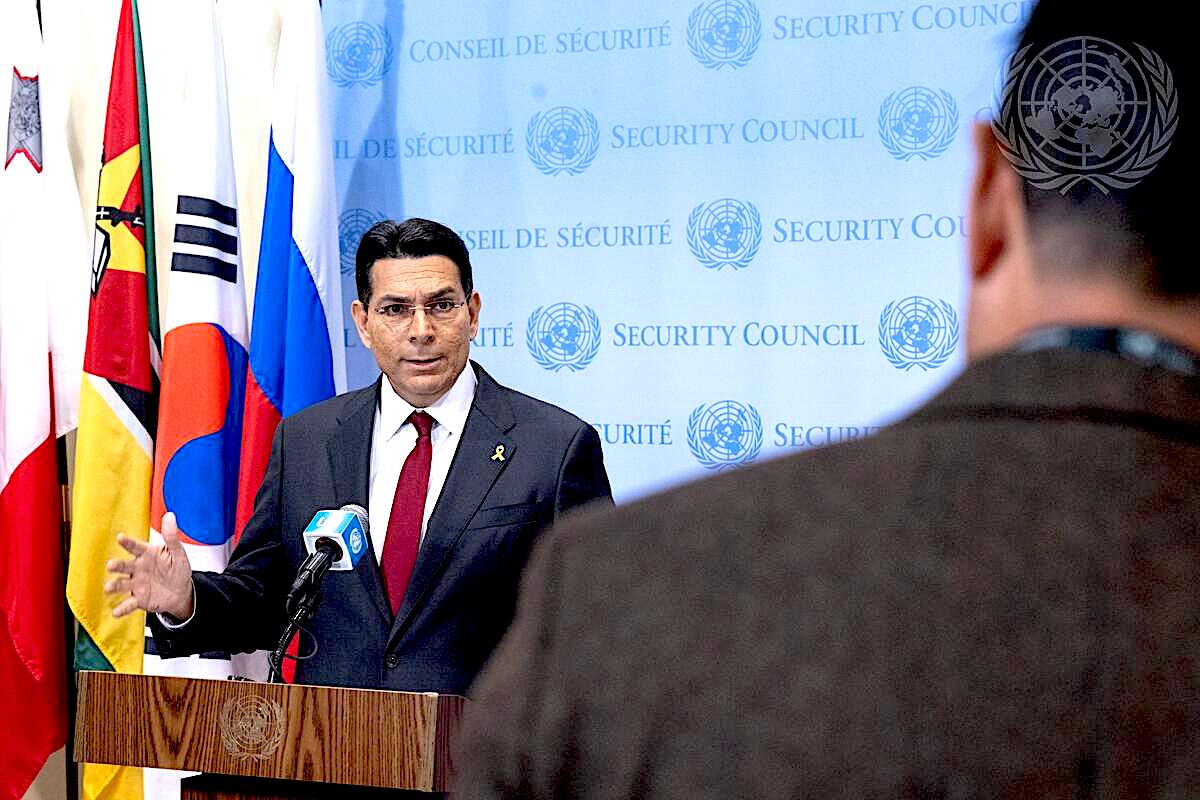
Danny Danon, Israel’s U.N. ambassador, addressing reporters at the U.N. on Wednesday. (UN Photo/Evan Schneider)
By Anton Ferreira
PassBlue
Israel’s devastating onslaught on Gaza, now approaching the one-year mark, and increasing settler outrages in the West Bank are giving fresh urgency to moves to suspend the Jewish state from the United Nations General Assembly.
Palestinian civil society has long been calling for such a step, and the Gaza war, along with the two major pronouncements from the International Court of Justice (ICJ) about Israel this year, have given the initiative new traction.
The idea is to use the same mechanism against the Jewish state that was used in 1974 to freeze apartheid South Africa’s participation in the General Assembly. The action contributed to the white minority government’s isolation and its eventual collapse.
It was the new, democratic South African state that brought the genocide application against Israel in the ICJ, resulting in an interim judgment by the court in January broadly supporting South Africa’s case.
"The first genocide in history where its victims are broadcasting their own destruction in real time in the desperate, so far vain hope that the world might do something."
That was at the ICJ seven months ago.pic.twitter.com/WGU1e8M23y
— Saul Staniforth (@SaulStaniforth) August 28, 2024
Then in July, the court — responding to a General Assembly request — delivered an advisory opinion finding that Israel’s occupation of the Palestinian territories amounted to colonization, racial discrimination and apartheid.
The Palestinian BDS National Committee (BNC) is leading the drive for Israel’s suspension, Maren Mantovani, the international outreach coordinator of the Stop the Wall campaign, told PassBlue. The organization is based in Ramallah, the Palestinian capital in the West Bank.
“There is an ongoing, concerted effort by Palestinian civil society to push the U.N. to uphold its mission . . . and to define and enact the precise modalities to end Israel’s crimes and violations,” Mantovani said.
Saleh Hijazi, a BNC adviser on apartheid-free policy, said he expected calls for Israel’s suspension to intensify next month with the opening of the 79th session of the General Assembly. UNGA, as it is known, begins on Sept. 10.
(The Palestinian delegation at the U.N. said on Aug. 22 that it was also planning to soon initiate an “actionable resolution” in the General Assembly, “demanding within a time frame the end of this illegal occupation and all other issues contained” in the ICJ advisory opinion.)
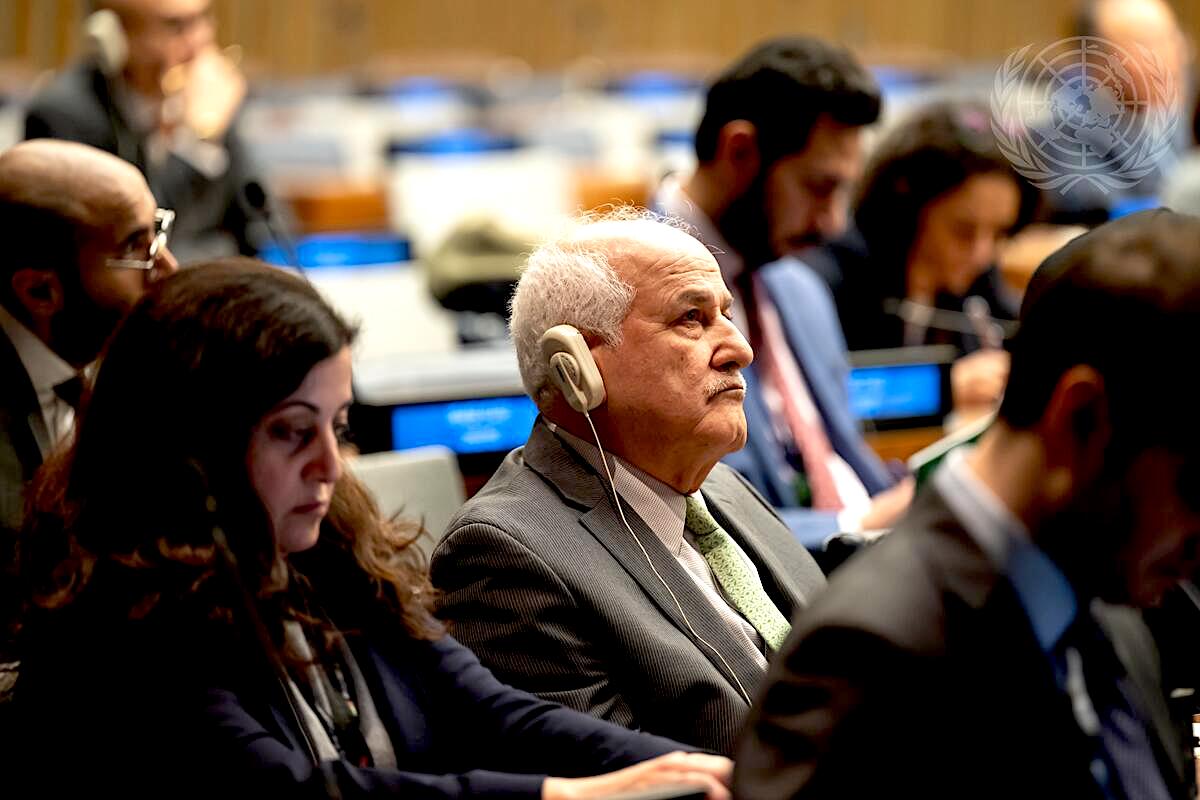
Palestine’s Riyad Mansour at a U.N. meeting in January. (UN Photo/Mark Garten)
“I have been in a number of international forums over the past few months, including a joint meeting between the Organization of Islamic Co-operation and the U.N. Committee on the Exercise of the Inalienable Rights of the Palestinian People, where sanctions, including diplomatic [measures] and suspending Israel from UNGA, were a big part of the discussion,” Hijazi said by email.
“Indeed, civil society organizations, movements and grassroots groups the world over support such a call and see it as necessary.”
Among those who have expressed support is Balakrishnan Rajagopal, the U.N. special rapporteur on the right to adequate housing.
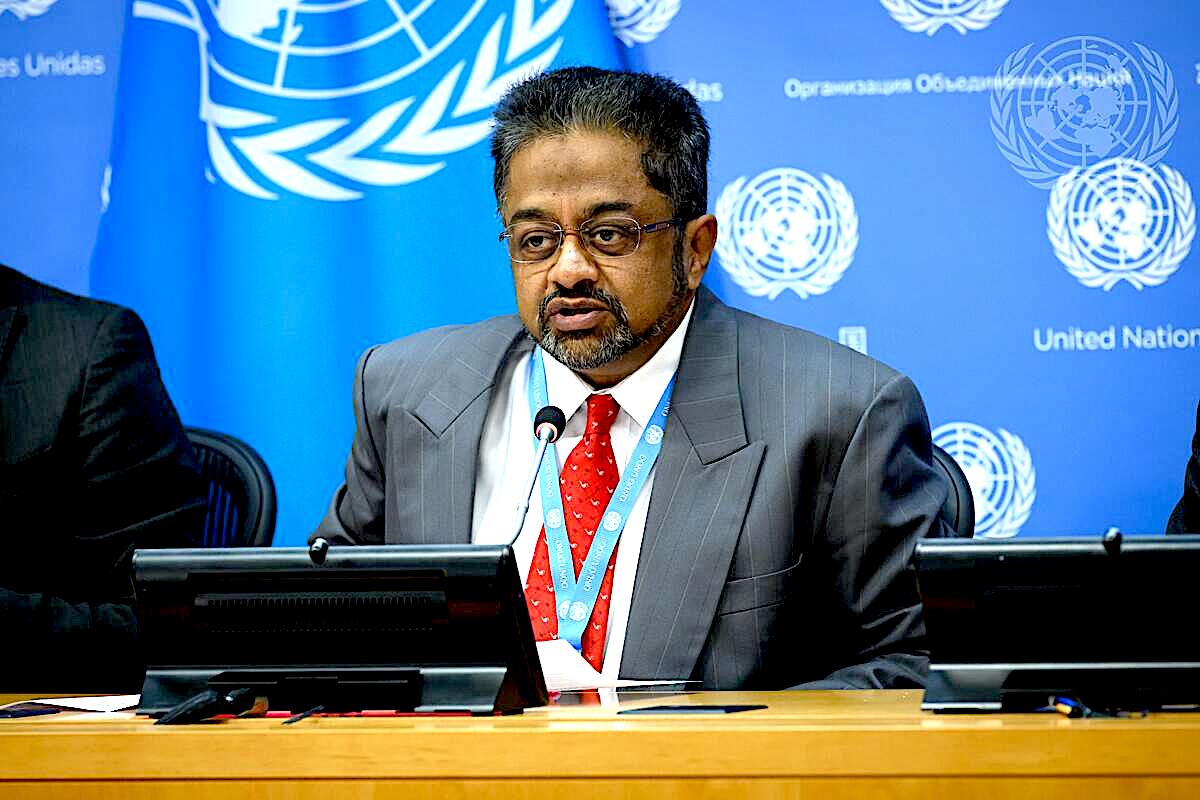
Rajagopal in October 2022. (U.N. Photo/Loey Felipe)
“I hope that the Global South . . . increases pressure for meaningful action to stop the genocide in Gaza, end the occupation of Palestine and ensure that perpetrators of grave crimes are brought to justice,” he said in an email. “One of those actions could very well be based on the precedent set by the action taken against apartheid South Africa.”
Craig Mokhiber, an international human rights lawyer who formerly worked for the U.N., wrote in a message to PassBlue that “it would be hard to imagine a country more deserving, as a minimum, of suspension from the UNGA.”
“The precedent of the suspension of apartheid South Africa is well established,” he noted. “The UNGA should move at once to suspend Israel, and to direct the Organization to use its resources and mechanisms to combat Israel’s apartheid and gross violations of human rights, just as it did in South Africa.”
He added that no country had more consistently violated the principles of the U.N. Charter than Israel.
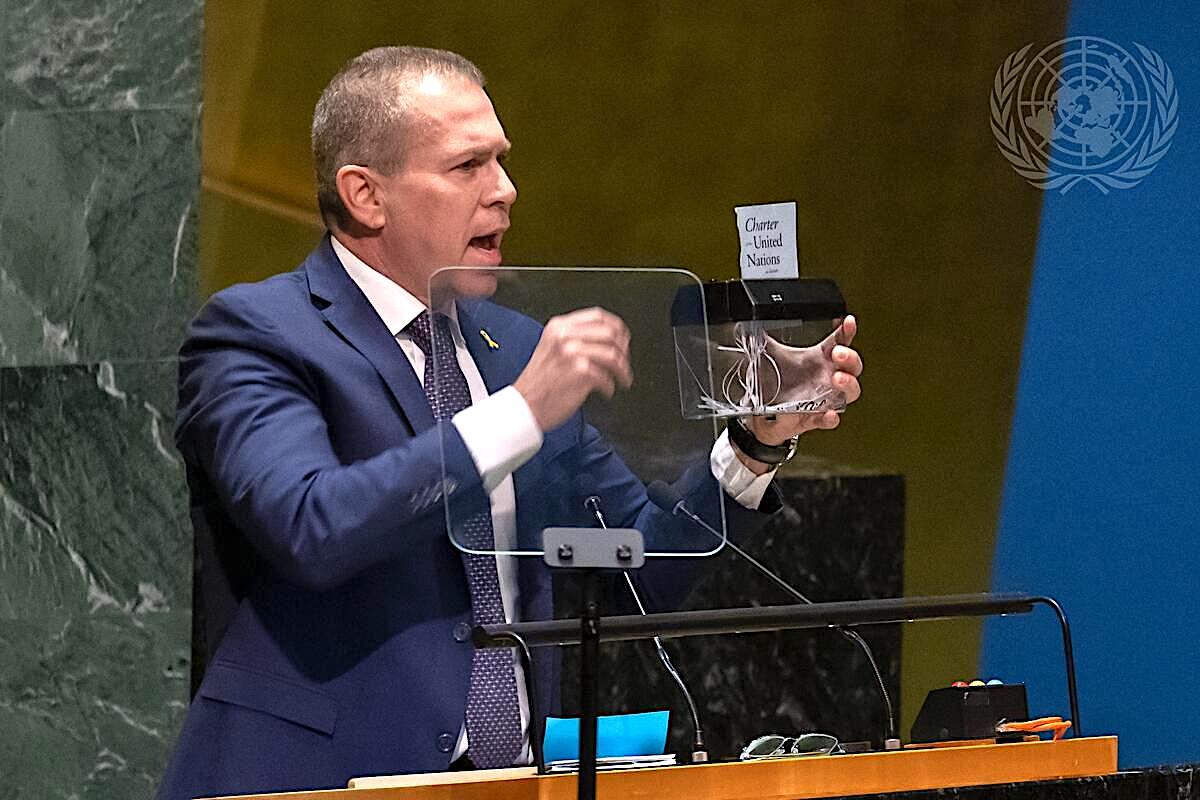
Gilad Erdan, Israel’s then U.N. ambassador, shredding a page of the U.N. Charter on May 10, as he addressed a General Assembly session on “Illegal Israeli actions in occupied East Jerusalem and the rest of the Occupied Palestinian Territory.” (UN Photo/Manuel Elías)
“Israel is today on trial in the World Court for genocide, its leaders are the subject of arrest warrant requests in the ICC [International Criminal Court] for crimes against humanity, the ICJ has found it is perpetrating apartheid and that its decades-long occupation of the Palestinian territory is unlawful,” he said.
The ICC Prosecutor today submitted a 49-page brief (attached) asking the ICC to reject the objections & delaying tactics of Israel & its allies (on jurisdiction, Oslo & complementarity). He urges the ICC to urgently issue the warrants for Netanyahu, Gallant & others.…
— Craig Mokhiber (@CraigMokhiber) August 24, 2024
The council of the League of Arab States resolved at a meeting in Cairo in July to pursue the idea of suspending Israel, but so far no U.N. member state has taken any formal steps to do so.
The South African government, which has placed Palestinian solidarity front and center of its foreign policy, has yet to discuss the suspension issue, said Clayson Monyela, the spokesperson for the Department of International Relations and Cooperation.
Nevertheless, South African nongovernmental organizations are confident that Pretoria would be in the vanguard of the effort.
“We expect South Africa would fully support it at all levels,” Bram Hanekom, a board member of Africa4Palestine, said in a phone interview with PassBlue. “It’s a domestic issue for us, it speaks to morality, it speaks to justice, it speaks to our own history.”
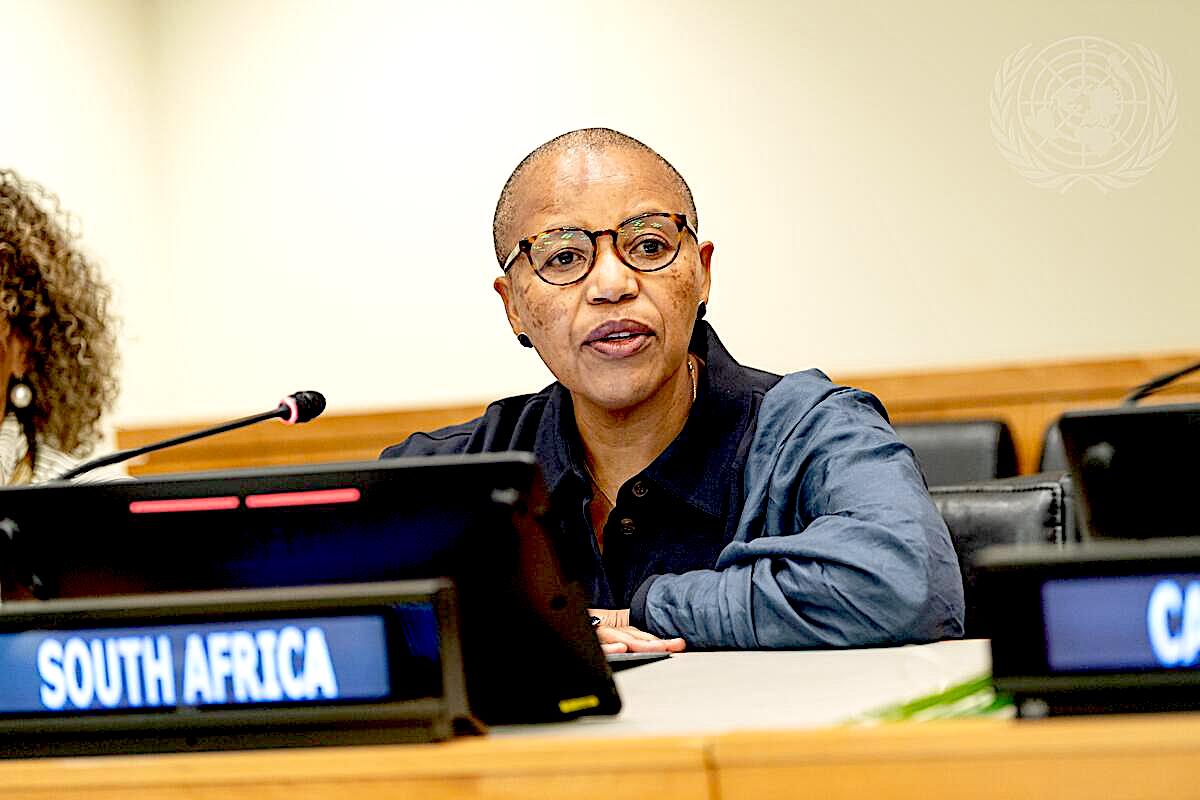
South Africa’s U.N. ambassador, Mathu Joyini, in May. (UN Photo/Rick Bajornas)
But South Africa is heavily dependent on its trade relations with the United States and needs to avoid alienating lawmakers in Washington even more than it has already — not only by bringing the genocide case, but also by failing to condemn Moscow for its invasion of Ukraine and by maintaining close ties with Iran and China.
So pushing for Israel’s suspension would come with “serious risks,” Hanekom said. “We’re doing this incredible balancing act as a country.”
The Mideast analyst Mouin Rabbani cites Washington’s global clout when he says the Palestinian campaign might have symbolic importance, but it is unlikely to result in its proclaimed goal of another victory like the one against South Africa in 1974.
“There are fundamental differences between the situation you had with South Africa in the 1970s and the situation with Palestine now,” Rabbani said in a phone call.
“The South African suspension came in the context of the Cold War, where you had very clear voting blocs and any anticolonial resolution had a virtually automatic majority,” he added. “The situation now is very different, where there aren’t really solid blocs the way you had in the 1970s, and an additional consequence of that is that individual governments are much more susceptible to U.S. and European lobbying.”
Moreover, Washington is far more invested in Israel than it was in South Africa 50 years ago and would be “much more energetic” in opposing moves to suspend the Jewish state, Rabbani said.
“Another factor is, you don’t have the kind of universal global revulsion against the very existence of the Israeli regime the way you had towards the white minority regime in South Africa — its very existence was seen as beyond the pale in most of the world. I don’t think we’ve yet reached that situation with Israel.
People tend to put a lot of blame and responsibility on [Prime Minister Benjamin] Netanyahu, or this Israeli government, and the realization that the problem here is one of the regime, rather than of an individual leader, still has some ways to go.”
Mokhiber described Israel as holding “the world record for breaching U.N. resolutions.”
“[It] has been found responsible for gross and systematic violations of human rights and humanitarian law by successive U.N. commissions of inquiry and independent special procedures. Worse, it has killed more U.N. staff than any party in history (and by a wide margin), has detained and tortured U.N. staff, and has regularly attacked, slandered and obstructed the Organization and its duly-mandated operations.”
Neither the Israeli mission to the U.N. nor the Palestinian delegation responded to requests for comment.
Anton Ferreira worked for 23 years as a correspondent and desk editor at Reuters. He started in Hong Kong and later worked long-term assignments in the Mideast, Latin America, New York City, Washington and South Africa. Ferreira is now based in South Africa.
This article is from PassBlue.
Views expressed in this article may or may not reflect those of Consortium News.

By this time, Israel should have been expelled from the United Nations. Any self-respecting entity with a clear purpose to bring peace to the world would have done this a long time ago. Mouin Rabbani sounds like an apologist for Natanahue and the genocide in Gaza. I disagree with him, there exists now “the kind of universal global revulsion against the existence of the Israeli regime.” What is needed is political and existential courage on the part of a handful of world-governments (12 of them, perhaps) to get together and bring up the issue at the United Nations. I would also suggest that these same countries be the ones to be at the table when a one-state solution is finally seen as the only realistic and sane solution to this 75-year plus, disaster.
Don’t expect that a one-state solution would work. Zionists control the US government through political bribes siphoned from US aid to Israel, and could far more easily control any one-state government. The best solution is to relocate Israel to a low-density area duly purchased from or arranged by treaty with a democratic country.
The only solution allowing Israel to remain in Palestine would be the design of two viable states each with coastline, ports, water, farmland, and infrastructure, demilitarized and separated by a large DMZ enforced by neutral UN forces. Populations would have to relocate with property swaps or bonds backed by DMZ property, with payments reduced by any destruction of property. That inconvenience sure beats genocide.
The US would probably have to demilitarize Israel despite its bribes of the US government. Maybe BRICS will offer bribe-matching? My guess is that Israel must be embargoed and starved out to submit to any fair international conflict resolution, and the sooner the better.
Why stop with Israel?
Why not suspend Russia as well for their invasion of Ukraine? Or China for it’s human rights abuses against it’s Uighur population? Or every damn Islamic theocracy for it’s human rights abuses against homosexuals and women. Or the USA, for it’s legion of coups and color revolutions and various perfidious acts over the past 80 years?
The UN is no longer fit for purpose, if it ever was.
The US itself should have been suspended from the UN many times over. It has violated international law and human rights laws in more countries than we could count. I guess the best we could hope for is a sanctions and embargo policy against the US and it’s criminal gang in the West causing it to suffer the same pain it has dished out to others who refuse to bow to the empire. If money is power, withhold the money.
Agreed.
Half of the countries in the UN could be suspended for various acts of avarice and depravity. Just look at the composition of the UN’s Human Rights Council. It’s chock full of some of the worst human rights abusers on the planet. And we’re supposed to accept them as the arbiters of human rights?
Interestingly, de facto expulsion of Israel from the United Nations itself is possible using as precedent United Nations General Assembly Resolutions 1668 and 2758 through which Nationalist China was replaced by the Peoples Republic as the representative of China in 1971, i.e., the suggestion is that a similar process be used to recognize Palestine as the sole legal representative of the territory occupied by both Israel and the Palestinians (West Bank and Gaza). It would require a two-thirds vote of the membership as it would have to be treated as an important question, but might well eliminate the Security Council’s role in the decision.
A really interesting and even possible route. The bullying and threatening global strength of the Zionist controlled USA is truly overwhelming. Except in the General Assembly. It will of course threaten but if the global south sticks together it maybe that USA Zionism Suffers its first major defeat. Let’s hope so
Excellent Suggestion!
Of course Israel and the United States would resort to every sort of financial blackmail to resist this procedure. However a 2/3rds majority could be formed if led by the members (and future members) of a New World Financial Community…such as BRICS. This could be a most timely opportunity for the World to expose and oppose the United Zionists aspirations of world dominance.
Thank you, CN and Anton Ferreira for this interesting analysis.
The prospect of suspension of Israel from the UNGA reflects fears of US economic wars.
The treatment of Israel has disgraced the West but has exposed institutional flaws.
Elimination of UNSC policy control would be a major improvement, with many options.
Perhaps UNGA members should simply design a better institution and abandon the UN.
UNGA votes can then be weighted per population, and final on all policy matters.
Members can retain symbolic association with the UN for a generation until it is discredited.
The CongressOfDebate (dotcom) would be a very valuable addition, and public interface.
“The idea is to use the same mechanism against the Jewish state that was used in 1974 to freeze apartheid South Africa’s participation in the General Assembly. The action contributed to the white minority government’s isolation and its eventual collapse.”
Can’t happen soon enough.
The fact of the matter is that money trumps morality, and money is something that apartheid Israel has a lot more of than apartheid South Africa could only dream about. The suspension of Israel from the UN General Assembly is a noble goal, but I’m afraid it is also an unattainable one.
Donald Johnson is absolutely on target.
( See also, James Bamford, “Spy/Fail”, 2023.)
Rather than suspend israel…why not SUSPEND all arms shipments???
You know the answer …. $$$$$$$$$$$.
NATO countries make a killing selling arms to Israel and Ukraine. Those wars are good for business, and must be extended and expanded in order to keep the money flowing.
@steve:
as all warmongers say:
“peace does not pay!”
did they coin the phrase
“to make a killing”?